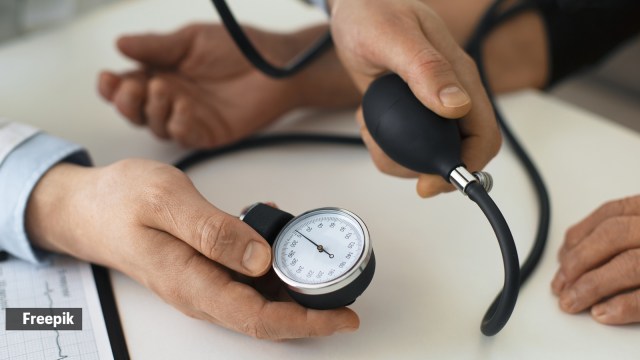📣 For more lifestyle news, click here to join our WhatsApp Channel and also follow us on Instagram
‘My blood pressure has been between 137/94-144/94 mmHg. Is that okay?’
Check your blood pressure at random times during the week, ideally in the morning before coffee or exercise. Pay attention to the average rather than just the individual spike.
 Is your blood pressure consistently high? (Photo: Freepik)
Is your blood pressure consistently high? (Photo: Freepik)Continuing with our quest to bring you informative pieces on understanding the various facets of blood sugar and blood pressure, we decided to take a Quora user’s query — ‘My blood pressure has been between 137/94-144/94 mmHg. Is that okay?’ — to an expert to gain deeper insights. Here’s what we found.
Dr Amit Saraf, director of internal medicine at Jupiter Hospital in Thane, said that those numbers fall into the “borderline high” or stage 1 hypertension range. “It’s not alarming, but it does need attention. The top number, or systolic, is slightly elevated, while the bottom number, or diastolic, is higher than ideal; we want readings closer to 120/80 mmHg,” said Dr Saraf.
Many people think that one slightly high reading means hypertension, but that’s not always the case.
“Blood pressure can rise temporarily due to stress, caffeine, anxiety, or even lack of sleep. What’s more important is consistency. If your readings are above 130/80 on most days, it indicates your heart and blood vessels are under more strain,” said Dr Saraf.
Should I be worried?
It’s not something to panic over, but it shouldn’t be ignored either. “Ongoing borderline hypertension can increase the risk of heart disease, kidney problems, or stroke over time, even if you feel fine now. The good news is that lifestyle changes can have a significant impact at this stage, possibly reducing the need for medication,” said Dr Saraf.
 Are you stressed? (Photo: Freepik)
Are you stressed? (Photo: Freepik)
What should I do now?
Track it carefully: Check your blood pressure at random times during the week, ideally in the morning before coffee or exercise. Pay attention to the average rather than just the individual spike.
Reduce salt and processed foods: Sodium can silently raise blood pressure. Limit your intake of pickles, papads, chips, and ready-to-eat meals.
Stay active: Engaging in brisk walking, yoga, or cycling for 30 to 40 minutes most days can help lower your numbers naturally.
Sleep and manage stress: Poor sleep or chronic stress can raise blood pressure, even in healthy individuals. Techniques like deep breathing and mindfulness can help.
Avoid self-medication: Don’t start or stop any blood pressure medications without consulting a doctor.
When to see a doctor?
If your readings are consistently above 140/90 for two weeks, or if you experience headaches, dizziness, chest discomfort, or blurred vision, it’s time for a check-up. Taking action early is the best way to protect your heart, said Dr Saraf.
DISCLAIMER: This article is based on information from the public domain and/or the experts we spoke to. Always consult your health practitioner before starting any routine.
📣 For more lifestyle news, click here to join our WhatsApp Channel and also follow us on Instagram







- 01
- 02
- 03
- 04
- 05




















